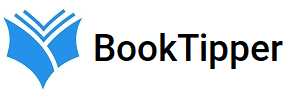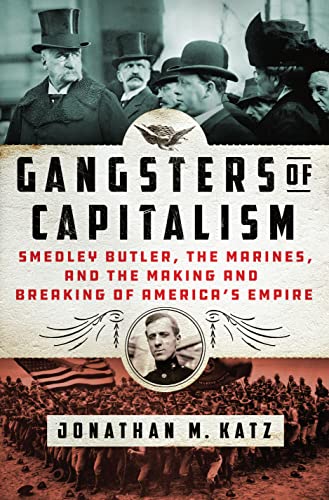
GANGSTERS OF CAPITALISM
by Jonathan M. Katz
A groundbreaking journey tracing America’s forgotten path to global power—and how its legacies shape our world today—told through the extraordinary life of a complicated Marine.
Smedley Butler was the most celebrated warfighter of his time. Bestselling books were written about him. Hollywood adored him. Wherever the flag went, “The Fighting Quaker” went—serving in nearly every major overseas conflict from the Spanish War of 1898 until the eve of World War II. From his first days as a 16-year-old recruit at the newly seized Guantánamo Bay, he blazed a path for empire: helping annex the Philippines and the land for the Panama Canal, leading troops in China (twice), and helping invade and occupy Nicaragua, Puerto Rico, Haiti, Mexico, and more. Yet in retirement, Butler turned into a warrior against war, imperialism, and big business, declaring: “I was a racketeer for capitalism.”
Award-winning author Jonathan Myerson Katz traveled across the world—from China to Guantánamo, the mountains of Haiti to the Panama Canal—and pored over the personal letters of Butler, his fellow Marines, and his Quaker family on Philadelphia’s Main Line. Along the way, Katz shows how the consequences of the Marines’ actions are still very much alive: talking politics with a Sandinista commander in Nicaragua, getting a martial arts lesson from a devotee of the Boxer Rebellion in China, and getting cast as a P.O.W. extra in a Filipino movie about their American War. Tracing a path from the first wave of U.S. overseas expansionism to the rise of fascism in the 1930s to the crises of democracy in our own time, Gangsters of Capitalism tells an urgent story about a formative era most Americans have never learned about, but that the rest of the world cannot forget.

ENOUGH ALREADY
by Valerie Bertinelli
Beloved actress, Food Network personality, and New York Times bestselling author Valerie Bertinelli reflects on life at sixty and beyond.
Behind the curtain of her happy on-screen persona, Valerie Bertinelli’s life has been no easy ride, especially when it comes to her own self-image and self-worth. She waged a war against herself for years, learning to equate her value to her appearance as a child star on One Day at a Time and punishing herself in order to fit into the unachievable Hollywood mold. She struggled to make her marriage to Eddie Van Halen — the true love of her life — work, despite all the rifts the rock-star lifestyle created between them. She then watched her son follow in his father’s footsteps, right up onto the stage of Van Halen concerts, and begin his own music career. And like so many women, she cared for her parents as their health declined and saw the roles of parent and child reverse. Through mourning the loss of her parents, discovering more about her family’s past, and realizing how short life really is when she and her son lost Eddie, Valerie finally said, “Enough already!” to a lifelong battle with the scale and found a new path forward to joy and connection. Despite hardships and the pressures of the media industry to be something she’s not, Valerie is, at last, accepting herself: she knows who she is, has discovered her self-worth, and has learned how to prioritize her health and happiness over her weight. With an intimate look into her insecurities, heartbreaks, losses, triumphs, and revelations, Enough Already is the story of Valerie’s sometimes humorous, sometimes raw, but always honest journey to love herself and find joy in the everyday, in family, and in the food and memories we share.
“This thoughtful, bighearted book is sure to be a hit with Bertinelli fans and those with an appetite for stories of hard-won self-acceptance. A warmly intimate memoir.”
– Kirkus Reviews
“In a series of brutally frank essays, Bertinelli looks back on the emotional struggles and triumphs of her life. By turns raw and inspiring, this contains a little bit of wisdom for everyone.”
– Publishers Weekly

THE HARD SELL
by Evan Hughes
The inside story of a band of entrepreneurial upstarts who made millions selling painkillers—until their scheme unraveled, putting them at the center of a landmark criminal trial.
“A feat of rigorous sleuthing and deft storytelling that unfolds with the velocity and verve of a Scorsese film… A tour de force.”
—Patrick Radden Keefe
John Kapoor had already amassed a small fortune in pharmaceuticals when he founded Insys Therapeutics. It was the early 2000s, a boom time for painkillers, and he developed a novel formulation of fentanyl, the most potent opioid on the market.
Kapoor, a brilliant immigrant scientist with relentless business instincts, was eager to make the most of his innovation. He gathered around him an ambitious group of young lieutenants. His head of sales—an unstable and unmanageable leader, but a genius of persuasion—built a team willing to pull every lever to close a sale, going so far as to recruit an exotic dancer ready to scrape her way up. They zeroed in on the eccentric and suspect doctors receptive to their methods. Employees at headquarters did their part by deceiving insurance companies. The drug was a niche product, approved only for cancer patients in dire condition, but the company’s leadership pushed it more widely, and together they turned Insys into a Wall Street sensation.
But several insiders reached their breaking point and blew the whistle. They sparked a sprawling investigation that would lead to a dramatic courtroom battle, breaking new ground in the government’s fight to hold the drug industry accountable in the spread of addictive opioids.
In The Hard Sell, National Magazine Award–finalist Evan Hughes lays bare the pharma playbook. He draws on unprecedented access to insiders of the Insys saga, from top executives to foot soldiers, from the patients and staff of far-flung clinics to the Boston investigators who treated the case as a drug-trafficking conspiracy, flipping cooperators and closing in on the key players.
With colorful characters and true suspense, The Hard Sell offers a bracing look not just at Insys, but at how opioids are sold at the point they first enter the national bloodstream—in the doctor’s office.
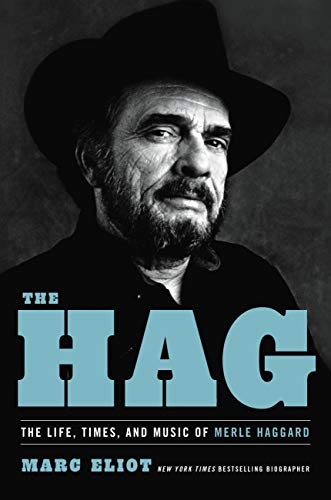
THE HAG
by Marc Eliot
The definitive biography of country legend Merle Haggard by the New York Times bestselling biographer of Clint Eastwood, Cary Grant, The Eagles, and more.
Merle Haggard was one of the most important country music musicians who ever lived. His astonishing musical career stretched across the second half of the 20th Century and into the first two decades of the next, during which he released an extraordinary 63 albums, 38 that made it on to Billboard’s Country Top Ten, 13 that went to #1, and 37 #1 hit singles. With his ample songbook, unique singing voice and brilliant phrasing that illuminated his uncompromising commitment to individual freedom, cut with the monkey of personal despair on his back and a chip the size of Monument Valley on his shoulder, Merle’s music and his extraordinary charisma helped change the look, the sound, and the fury of American music.
The Hag tells, without compromise, the extraordinary life of Merle Haggard, augmented by deep secondary research, sharp detail and ample anecdotal material that biographer Marc Eliot is known for, and enriched and deepened by over 100 new and far-ranging interviews. It explores the uniquely American life of an angry rebellious boy from the wrong side of the tracks bound for a life of crime and a permanent home in a penitentiary, who found redemption through the music of “the common man.”
Merle Haggard’s story is a great American saga of a man who lifted himself out of poverty, oppression, loss and wanderlust, to catapult himself into the pantheon of American artists admired around the world. Eliot has interviewed more than 100 people who knew Haggard, worked with him, were influenced by him, loved him or hated him. The book celebrates the accomplishments and explore the singer’s infamous dark side: the self-created turmoil that expressed itself through drugs, women, booze, and betrayal. The Hag offers a richly anecdotal narrative that will elevate the life and work of Merle Haggard to where both properly belong, in the pantheon of American music and letters.
The Hag is the definitive account of this unique American original, and will speak to readers of country music and rock biographies alike.

ALWAYS REMEMBER YOUR NAME
by Andra & Tatiana Bucci
A haunting WWII memoir of two sisters who survived Auschwitz that picks up where Anne Frank’s Diary left off and gives voice to the children we lost.
On March 28, 1944, six-year-old Tati and her four-year-old sister Andra were roused from their sleep and arrested. Along with their mother, Mira, their aunt, and cousin Sergio, they were deported to Auschwitz.
Over 230,000 children were deported to the camp, where Josef Mengele, the Angel of Death, performed deadly experiments on them. Only a few dozen children survived, Tati and Andra among them.
Tati, Andra, and Sergio were separated from their mothers upon arrival. But Mira was determined to keep track of her girls. After being tattooed with their inmate numbers, she made them memorize her number and told them to “always remember your name.” In keeping this promise to their mother, the sisters were able to be reunited with their parents when WWII ended.
An unforgettable narrative of the power of sisterhood in the most extreme circumstances, and of how a mother’s love can overcome the most impossible odds, the Bucci sisters’ memoir is a timely reminder that separating families is an inexcusable evil.
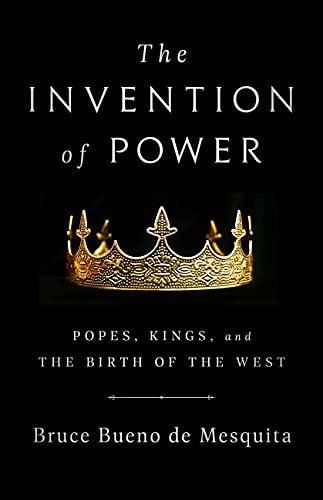
THE INVENTION OF POWER
by Bruno Bueno de Mesquita
In the tradition of Why Nations Fail, this book solves one of the great puzzles of history: Why did the West become the most powerful civilization in the world?
Western exceptionalism—the idea that European civilizations are freer, wealthier, and less violent—is a widespread and powerful political idea. It has been a source of peace and prosperity in some societies, and of ethnic cleansing and havoc in others.
Yet in The Invention of Power, BruceBueno de Mesquita draws on his expertise in political maneuvering, deal-making, and game theory to present a revolutionary new theory of Western exceptionalism: that a single, rarely discussed event in the twelfth century changed the course of European and world history. By creating a compromise between churches and nation-states that, in effect, traded money for power and power for money, the 1122 Concordat of Worms incentivized economic growth, facilitated secularization, and improved the lot of the citizenry, all of which set European countries on a course for prosperity. In the centuries since, countries that have had a similar dynamic of competition between church and state have been consistently better off than those that have not.
The Invention of Power upends conventional thinking about European culture, religion, and race and presents a persuasive new vision of world history.

SWEAT: A HISTORY OF EXERCISE
by Bill Hayes
From Insomniac City author Bill Hayes, “who can tackle just about any subject in book form, and make you glad he did” (SF Chronicle)-a cultural, scientific, literary, and personal history of exercise.
Exercise is our modern obsession, and we have the fancy workout gear and fads from HIIT to spin classes to hot yoga to prove it. Exercise-a form of physical activity distinct from sports, play, or athletics-was an ancient obsession, too, but as a chapter in human history, it’s been largely overlooked. In Sweat, Bill Hayes runs, jogs, swims, spins, walks, bikes, boxes, lifts, sweats, and downward-dogs his way through the origins of different forms of exercise, chronicling how they have evolved over time, dissecting the dynamics of human movement.
Hippocrates, Plato, Galen, Susan B. Anthony, Jack LaLanne, and Jane Fonda, among many others, make appearances in Sweat, but chief among the historical figures is Girolamo Mercuriale, a Renaissance-era Italian physician who aimed singlehandedly to revive the ancient Greek “art of exercising” through his 1569 book De arte gymnastica. Though largely forgotten over the past five centuries, Mercuriale and his illustrated treatise were pioneering, and are brought back to life in the pages of Sweat. Hayes ties his own personal experience-and ours-to the cultural and scientific history of exercise, from ancient times to the present day, giving us a new way to understand its place in our lives in the 21st century.

DOOMSDAY MOTHER
by John Glatt
In The Doomsday Mother, bestselling true crime author John Glatt tells the twisted tale of Lori Vallow, accused of having her two children murdered to start a new life with her new husband, doomsday prepper Chad Daybell.
At first, the residents of Kauai Beach Resort took little notice of their new neighbors. The glamorous blonde and her tall husband fit the image of the ritzy gated community. The couple seemed to keep to themselves―until the police knocked on their door with a search warrant. Lori Vallow and Chad Daybell had fled to Hawaii in the midst of being investigated for the disappearance of Lori’s children back in Idaho―Tylee and JJ―who hadn’t been seen alive in five months.
For years, Lori Vallow had been devoted to her children and her Mormon faith. But when her path crossed with Chad Daybell, a religious zealot who taught his followers how to prepare for the end-times, the tumultuous relationship transformed her into someone unrecognizable. As authorities searched for Lori’s children, they uncovered more suspicious deaths with links to both Lori and Chad, including the death of Lori’s third and fourth husbands, her brother, and Chad’s wife. In June 2020, the gruesome remains of JJ and Tylee were discovered on Chad’s property, and the newlyweds were arrested and charged with murder. And in a shocking development, horrifying statements revealed that the couple’s fanatical beliefs had convinced them the children had become zombies–a belief that may have led to their deaths.
Bestselling author and journalist John Glatt takes readers deeper into the devastating story of Lori Vallow and Chad Daybell in an attempt to unravel the lethal relationship of this doomsday couple.
Still Hot in Non-Fiction & Biography
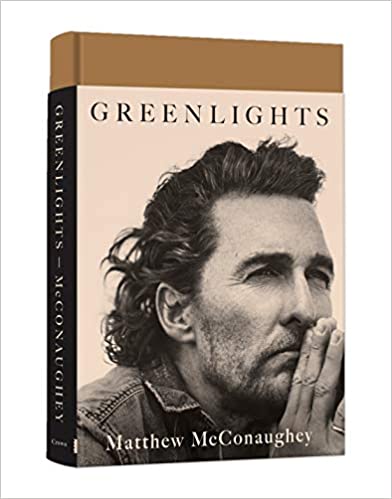
GREENLIGHTS
by Matthew McConaughey
#1 NEW YORK TIMES BESTSELLER • Discover the life-changing memoir that has inspired millions of readers through the Academy Award®–winning actor’s unflinching honesty, unconventional wisdom, and lessons learned the hard way about living with greater satisfaction.
NAMED ONE OF THE BEST BOOKS OF THE YEAR BY THE GUARDIAN
“McConaughey’s book invites us to grapple with the lessons of his life as he did—and to see that the point was never to win, but to understand.”—Mark Manson, author of The Subtle Art of Not Giving a F*ck
I’ve been in this life for fifty years, been trying to work out its riddle for forty-two, and been keeping diaries of clues to that riddle for the last thirty-five. Notes about successes and failures, joys and sorrows, things that made me marvel, and things that made me laugh out loud. How to be fair. How to have less stress. How to have fun. How to hurt people less. How to get hurt less. How to be a good man. How to have meaning in life. How to be more me.
Recently, I worked up the courage to sit down with those diaries. I found stories I experienced, lessons I learned and forgot, poems, prayers, prescriptions, beliefs about what matters, some great photographs, and a whole bunch of bumper stickers. I found a reliable theme, an approach to living that gave me more satisfaction, at the time, and still: If you know how, and when, to deal with life’s challenges—how to get relative with the inevitable—you can enjoy a state of success I call “catching greenlights.”
So I took a one-way ticket to the desert and wrote this book: an album, a record, a story of my life so far. This is fifty years of my sights and seens, felts and figured-outs, cools and shamefuls. Graces, truths, and beauties of brutality. Getting away withs, getting caughts, and getting wets while trying to dance between the raindrops.
Hopefully, it’s medicine that tastes good, a couple of aspirin instead of the infirmary, a spaceship to Mars without needing your pilot’s license, going to church without having to be born again, and laughing through the tears.
It’s a love letter. To life.
It’s also a guide to catching more greenlights—and to realizing that the yellows and reds eventually turn green too.
Good luck.

THE DAWN OF HUMANITY
by David Graeber & David Wengow
A dramatically new understanding of human history, challenging our most fundamental assumptions about social evolution—from the development of agriculture and cities to the origins of the state, democracy, and inequality—and revealing new possibilities for human emancipation.
For generations, our remote ancestors have been cast as primitive and childlike—either free and equal innocents, or thuggish and warlike. Civilization, we are told, could be achieved only by sacrificing those original freedoms or, alternatively, by taming our baser instincts. David Graeber and David Wengrow show how such theories first emerged in the eighteenth century as a conservative reaction to powerful critiques of European society posed by Indigenous observers and intellectuals. Revisiting this encounter has startling implications for how we make sense of human history today, including the origins of farming, property, cities, democracy, slavery, and civilization itself.
Drawing on pathbreaking research in archaeology and anthropology, the authors show how history becomes a far more interesting place once we learn to throw off our conceptual shackles and perceive what’s really there. If humans did not spend 95 percent of their evolutionary past in tiny bands of hunter-gatherers, what were they doing all that time? If agriculture, and cities, did not mean a plunge into hierarchy and domination, then what kinds of social and economic organization did they lead to? The answers are often unexpected, and suggest that the course of human history may be less set in stone, and more full of playful, hopeful possibilities, than we tend to assume.
The Dawn of Everything fundamentally transforms our understanding of the human past and offers a path toward imagining new forms of freedom, new ways of organizing society. This is a monumental book of formidable intellectual range, animated by curiosity, moral vision, and a faith in the power of direct action.
